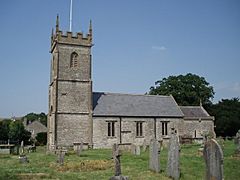Church of All Saints, Farmborough facts for kids
Quick facts for kids Church of All Saints |
|
|---|---|
 |
|
| Location | Farmborough, Somerset, England |
| Built | 15th century |
|
Listed Building – Grade II*
|
|
| Designated | 21 September 1960 |
| Reference no. | 1136439 |
| Lua error in Module:Location_map at line 420: attempt to index field 'wikibase' (a nil value). | |
The Church of All Saints is a special church in Farmborough, Somerset, England. It belongs to the Anglican faith, which is a type of Christianity. This church is very old! Most of it was built in the 1400s (the 15th century), but some parts are even older, from the 1300s. It's also a 'Grade II* listed building', which means it's a very important historical building that needs to be protected.
Contents
Exploring the Church Building
The Church of All Saints has several interesting parts. Inside, you'll find the nave, which is the main area where people sit. There's also the chancel, which is the part near the altar. On one side, there's a north aisle, which is like a walkway. The church also has a porch at the entrance.
The Tower and Its History
The church's tall west tower has three levels and is from the 1400s. However, many other parts of the church building are newer. In 1869, the church went through a big update called a Victorian restoration. During this time, a new nave was built by an architect named John Elkington Gill.
Beautiful Stained Glass
One of the most beautiful features of the church is its stained glass. This colorful glass was made in 1838. It wasn't always in Farmborough, though! It was moved here in 1982 from another church in Brighton that was being taken down. The design of this stained glass was inspired by the famous glass at New College, Oxford. That original glass was designed by a well-known artist from the 1700s, Sir Joshua Reynolds.
Famous People Connected to the Church
The Church of All Saints has a connection to an important historical figure. In the 1400s, a person named John Stafford was the rector of Farmborough. A rector is like the main priest of a church. John Stafford later became the Archbishop of Canterbury, which is the most senior leader of the Church of England.
See also
- List of ecclesiastical parishes in the Diocese of Bath and Wells

